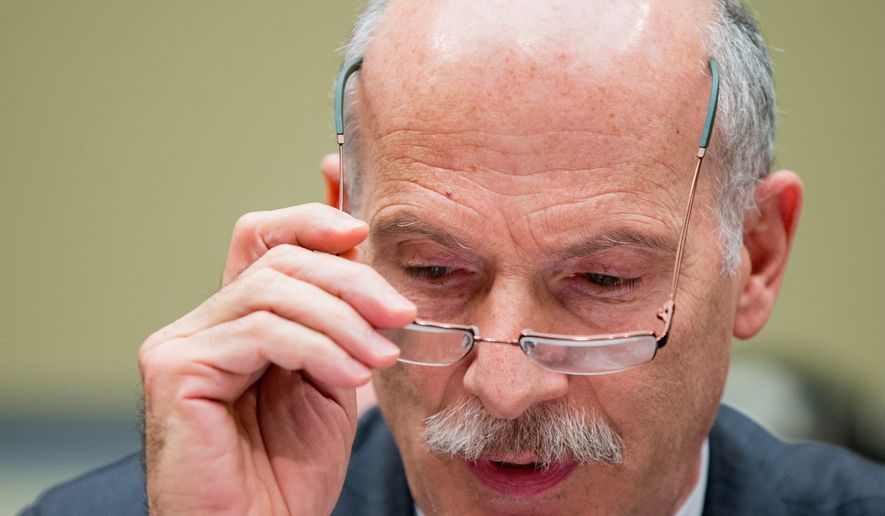D.C. Council Chairman Phil Mendelson said Monday that lawmakers have seen an increase in the number of contracts requiring retroactive approval, suggesting that some city agencies “don’t know what they are doing” in drafting the agreements with vendors.
Mr. Mendelson said late contracts put the D.C. government “behind the eight ball” by placing the city in a less advantageous position to negotiate the best price for vendor services, jeopardizing the budget process and making errors more likely. He said such “bad planning” in procurement could lead to poor performance.
“It’s my belief that some of the agencies do not have an efficient procurement operation, and so they are not on top of things. That in itself speaks to the cost and the harm to the taxpayer,” Mr. Mendelson said in an interview with The Washington Times. “To oversimplify it, some of the agencies don’t know what they are doing, so they come in with these contracts late.”
But Mayor Muriel Bowser said she doesn’t regard the council’s retroactive approval as making a contract “late.”
“I don’t know that we have a plethora of contracts coming late, let me start there,” Miss Bowser said last week. “When I became mayor, I created a review board — our contracts Procurement Accountability Review Board … where the city administrator, myself and the chief procurement officer review any retroactive contracts.”
The mayor said the review board “has been pretty inactive the last year, which means we haven’t had any [late contracts]. So if we had some at the end of the last year, they were anomalous.”
The council is required to oversee and approve all city contracts over $1 million. Some agencies have drafted contracts below $1 million and later edited them to exceed that amount, requiring council approval.
Since January last year, the council has had to give retroactive approval to 63 contracts that originally were executed below the $1 million threshold.
Last week, the council retroactively approved a second-option year contract between the D.C. Department of Behavioral Health and MBI Health Services LLC to provide social services for 94 youths. The second-option year contract originally was drafted for $545,798.50 but was then edited to $1,091,597 — the same amount as the first-option year contract that expired in July.
In June, the contracting officer received notification that the Department of Behavioral Health wanted to continue services with MBI Mental Health Services, but the contract didn’t reach the council for approval until this month, according to the Office of Contracting and Procurement council contract summary.
Last month, the council retroactively approved a contract between the D.C. Child and Family Services Agency and the East River Family Strengthening Collaborative. The original contract was for $866,893.03; the edited version was $3,467,575.93 — a 300% increase.
According to the council contract summary from the Child and Family Services Agency, the contract was late because of revised service numbers that required the collaborative to reevaluate its staffing and ultimately delay the contract process.
“When we are dealing with contracts on a retroactive basis, it suggests an absence of planning and, as we know prior, planning prevents poor performance,” which is why the law requires the contracts to go to the council in a timely manner, Mr. Mendelson said.
A city procurement official said the contracting and procurement process is working as intended.
The council has 10 days to review a contract for passive approval. During that time, lawmakers can request an additional 45 days to take a closer look at the contract and decide whether to approve it.
City agencies have the opportunity to renew contracts and receive council approval again when option-year contracts expire.
Instead of submitting the renewed full-year contracts to the council with sufficient time to approve them, the mayor’s office first enacts a partial-year contract under $1 million, which doesn’t require council approval. At the end of the partial period, an edited contract is submitted to the council for the full cost of the contract for retroactive approval.
Edited contracts that are later approved are called “tipping contracts,” which are meant to give the mayor the opportunity to retroactively get council approval on a contract that ends up costing more than expected, not as a means to continue a contract after the deadline to renew it has passed. The mayor’s Procurement Accountability Review Board does not review tipping contracts.
A clause in the base contracts, however, allow agencies to execute a partial-year contract. This allows agencies to continue receiving services while determining whether they have enough money in the budget to renew the contract for a full year or amend it.
“These are not emergency contracts, and they are in line with the executive’s authority for contract actions and in line for the option period clause for previously negotiated, reviewed by council and awarded contracts,” George Schutter, the D.C. government’s chief procurement officer, told The Times.
Mr. Mendelson said he would schedule an early morning hearing at which he plans to invite the Child and Family Services Agency, the Department of Behavioral Health and the Office of Contracting and Procurement to ask why the contracts have been late and to convey the message that they could have been sent to the council sooner.
• Sophie Kaplan can be reached at skaplan@washingtontimes.com.




Please read our comment policy before commenting.